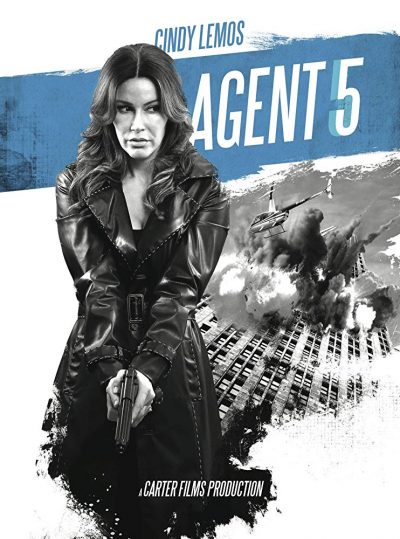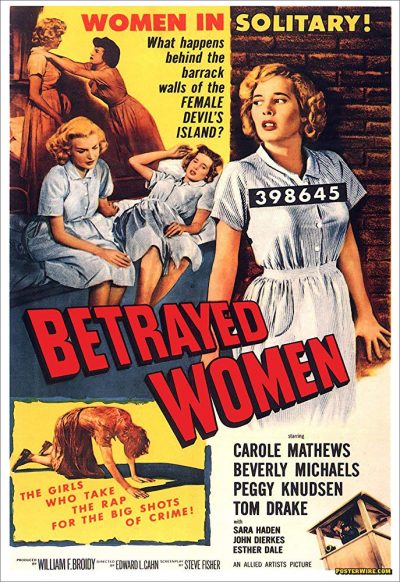★★½
“Sleepless in Seattle”
 Coincidentally, this one-man production was watched immediately after another, also put together toward the north-west corner, around the USA/Canadian border. But Carter Johnson is relatively restrained compared to Shadow of the Lotus‘s Jeff L’Heureux, Johnson’s name only appearing ten times in the end credits. While not dissimilar in low-budget approach, Agent 5 likely comes out just on top of the two, due to better pacing and sleeker look.
Coincidentally, this one-man production was watched immediately after another, also put together toward the north-west corner, around the USA/Canadian border. But Carter Johnson is relatively restrained compared to Shadow of the Lotus‘s Jeff L’Heureux, Johnson’s name only appearing ten times in the end credits. While not dissimilar in low-budget approach, Agent 5 likely comes out just on top of the two, due to better pacing and sleeker look.
The titular heroine is Jada (Lemos), an assassin for a shadowy group which brought her up and trained her to kill, after the death of her parents. However, her programming is broken after she’s assigned the target of a whistleblowing doctor, whose elimination has been ordered by the pharmaceutical company which employed him. He convinces her to spare his life: although nearby colleagues still complete the job, before his death, he gives her the folder of incriminating data, information which could save thousands of lives. When Agent 5 goes public with it, her own employer decides she must be eliminated for her treachery, and the call goes out that she is to be located and killed. Easier said than done, though, especially when the target has decided to take the battle to her boss.
The action is competent. Nothing especially memorable, yet those involved are wise enough to know their limitations, and operate within them, rather than pushing the envelope and coming up short. Plotwise, there are some wobbly aspects: as with Lotus, the director being the writer probably hampers seeing such deficiencies. Jada exerts no effort to make things difficult for her ex-employer. If I was the subject of a brigade of assassins, I’d have moved to another country (or at least another state), drastically changed my appearance and gone as far off the grid as possible. Agent 5 does none of this, and keeps driving around town – likely for the prosaic reason that it would have posed production difficulties. Her “defection” also needed additional work: as it stands, she goes from apparently dedicated killer to rebel on the strength of a thirty-second conversation. Showing her as already disgruntled and with thoughts of quitting, would have made this much more plausible.
Originally developed as a short web series back in 2012, the main strength for the feature-length version is on the visual side. The technical quality of the footage here is so slick, it’s all but indistinguishable from a fully professional production (from what I can gather, it’s more of a high-end hobby effort for most involved). If only the same could be said about the performances, which are the biggest problem. Not so much Lemos – I’m not the only person to think she could perhaps be mistaken for Kate Beckinsale under certain lighting conditions. But the rest of the cast are all over the place, things likely reaching their nadir in the male “newscaster,” whose acting is so spectacularly awkward, I rewound it, purely for amusement purposes.
Dir: Carter Johnson
Star: Cindy Lemos, Ben Andrews, Andrew Tribolini, Roy Stanton





 Around the turn of the millennium, Parvana (Chaudry) is an 11-year-old girl living in Kabul, Afghanistan – then under the strict religious rule of the Taliban, in the aftermath of the Russian retreat. Her father is arrested and taken off to prison, leaving his wife and children without a male guardian. Which is kinda important, because under Taliban law, women are not allowed out in public unaccompanied. With no other option, Parvana cuts her hair and dresses as a boy in order to be able to get supplies for her family. Teaming up with another boy-who-isn’t, Shauzia (Bhatia), they find work. Parvana starts saving for the bribes necessary to see, and hopefully win the release of, her father; Shauzia is saving up for her long-held dream of seeing the ocean. Of course, it’s never that easy, especially post-9/11, when the country is invaded by America and its allies.
Around the turn of the millennium, Parvana (Chaudry) is an 11-year-old girl living in Kabul, Afghanistan – then under the strict religious rule of the Taliban, in the aftermath of the Russian retreat. Her father is arrested and taken off to prison, leaving his wife and children without a male guardian. Which is kinda important, because under Taliban law, women are not allowed out in public unaccompanied. With no other option, Parvana cuts her hair and dresses as a boy in order to be able to get supplies for her family. Teaming up with another boy-who-isn’t, Shauzia (Bhatia), they find work. Parvana starts saving for the bribes necessary to see, and hopefully win the release of, her father; Shauzia is saving up for her long-held dream of seeing the ocean. Of course, it’s never that easy, especially post-9/11, when the country is invaded by America and its allies. We know very well that, on low-budget films, people have to wear many hats. Hell, my IMDb entry began when a film I was supposed to be helping my wife produce, had an actor drop out. You can only respect those who can turn their hands to multiple jobs. And, yet… There’s a point at which it become self-defeating, because nobody can be
We know very well that, on low-budget films, people have to wear many hats. Hell, my IMDb entry began when a film I was supposed to be helping my wife produce, had an actor drop out. You can only respect those who can turn their hands to multiple jobs. And, yet… There’s a point at which it become self-defeating, because nobody can be  My first viewing of this was on a day off from work, when I was down with some sinusy thing, and dosed up on DayQuil. So I chalked my losing interest and drifting off to the meds, and once I felt better, decided this deserved the chance of a re-view. However, the result was still the same: even as a bright-eyed and bushy-tailed viewer, I found attention lapsing. For this animated version of a mature comic, might as well be a He-Man and the Masters of the Universe episode. Which is a shame. I wanted to like it, since the creator of Lady Death, Brian Pulido, is something of a local comics legend here in my adopted home state of Arizona. This should have been better.
My first viewing of this was on a day off from work, when I was down with some sinusy thing, and dosed up on DayQuil. So I chalked my losing interest and drifting off to the meds, and once I felt better, decided this deserved the chance of a re-view. However, the result was still the same: even as a bright-eyed and bushy-tailed viewer, I found attention lapsing. For this animated version of a mature comic, might as well be a He-Man and the Masters of the Universe episode. Which is a shame. I wanted to like it, since the creator of Lady Death, Brian Pulido, is something of a local comics legend here in my adopted home state of Arizona. This should have been better. Is it possible for a homage to be too accurate? This could be the problem here. It’s clear that Bickert has a deep affection for the “women in prison” genre – yet, again, possibly too much so. For this is less a parody or a pastiche than a loving re-creation, and doesn’t understand that a lot of these movies… well, to be honest, they suck. Badly acted, poorly plotted, thinly-disguised excuses for porn. And that’s the
Is it possible for a homage to be too accurate? This could be the problem here. It’s clear that Bickert has a deep affection for the “women in prison” genre – yet, again, possibly too much so. For this is less a parody or a pastiche than a loving re-creation, and doesn’t understand that a lot of these movies… well, to be honest, they suck. Badly acted, poorly plotted, thinly-disguised excuses for porn. And that’s the  Helen (Fonseca) is struggling to come to terms with the sudden, unexpected death of her scientist husband, who was engaged on a top-secret project with his partner, Tomas (Morshower). Then things get truly weird: she experiences the mother of all blackouts, missing an entire week, and shortly afterward, Helen receives a phone-call warning her to get out of her house… from herself. It turns out, husband and Tomas had come up with a limited form of time-travel. As a result of this and subsequent events, there are now
Helen (Fonseca) is struggling to come to terms with the sudden, unexpected death of her scientist husband, who was engaged on a top-secret project with his partner, Tomas (Morshower). Then things get truly weird: she experiences the mother of all blackouts, missing an entire week, and shortly afterward, Helen receives a phone-call warning her to get out of her house… from herself. It turns out, husband and Tomas had come up with a limited form of time-travel. As a result of this and subsequent events, there are now  As the lazy joke goes, I preferred this film the first time I saw it, when it was called… Well, actually, it was called
As the lazy joke goes, I preferred this film the first time I saw it, when it was called… Well, actually, it was called  Joan Butler (Bernadette) is an enforcer for mob boss Frank (Foster), with a zero-tolerance policy for those who disrespect her – whether they are on her side or not. When this eventually causes some of her gang to turn on Joan, she’s brutally beaten to a pulp, and apparently killed. However, she rises from the dead, now a figure who lives in the darkness, and one who has acquired the power to manipulate shadows. She sets about her mission of revenge against Frank and those who killed her. This is much to the distress of her on/off boyfriend Anthony (Celigo), a social worker. But her feelings for him and desire to protect the unfortunates with whom he works, puts them all at risk, when Frank realizes they represent her weak spot.
Joan Butler (Bernadette) is an enforcer for mob boss Frank (Foster), with a zero-tolerance policy for those who disrespect her – whether they are on her side or not. When this eventually causes some of her gang to turn on Joan, she’s brutally beaten to a pulp, and apparently killed. However, she rises from the dead, now a figure who lives in the darkness, and one who has acquired the power to manipulate shadows. She sets about her mission of revenge against Frank and those who killed her. This is much to the distress of her on/off boyfriend Anthony (Celigo), a social worker. But her feelings for him and desire to protect the unfortunates with whom he works, puts them all at risk, when Frank realizes they represent her weak spot.
 First, let me just say: that poster is a true work of art. Seriously, how can anyone look at that and
First, let me just say: that poster is a true work of art. Seriously, how can anyone look at that and